Here's how artificial intelligence is showing up in Nashville songwriting rooms
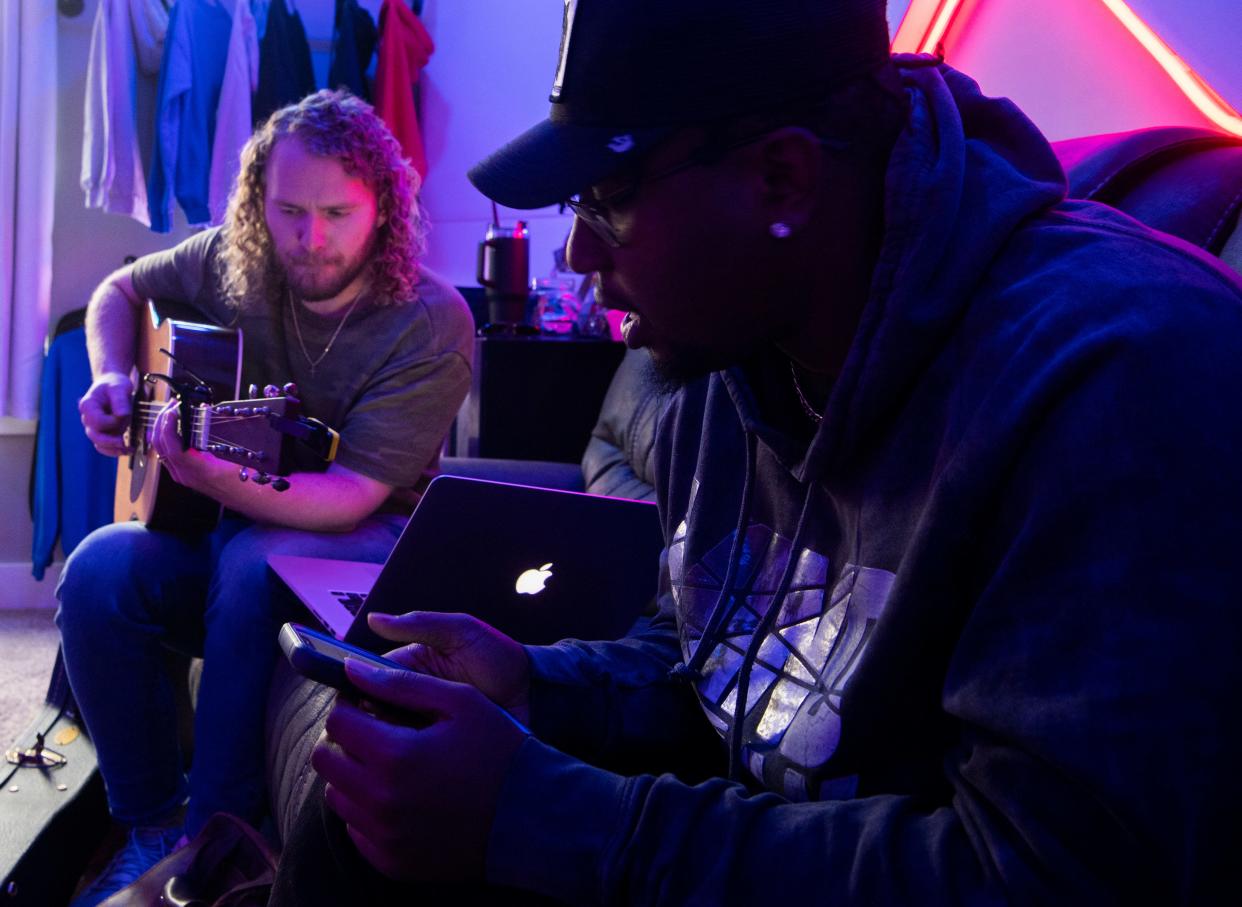
In a West Nashville production studio, country artist RVSHVD and songwriter Nick Wayne sang refrains back and forth to each other as the track to their soon-to-be new song played.
"Should we say 'driveway' first?" Wayne asked. They debated using the word in the lyrics for a while. RVSHVD, pronounced Rashad, agreed that it would be the best one to lean into the next refrain.
The songwriting process took five human brains — two audio engineers, a producer, a songwriter and the artist.
Though RVSHVD and his crew didn't use it — artificial intelligence is here. With the click of a couple buttons, a new hit country song could exist.
As it turns out, AI has been in the songwriting room for years. And now, artists and industry professionals alike are trying to figure out how to balance the use of this new technology with their ethics and creativity.
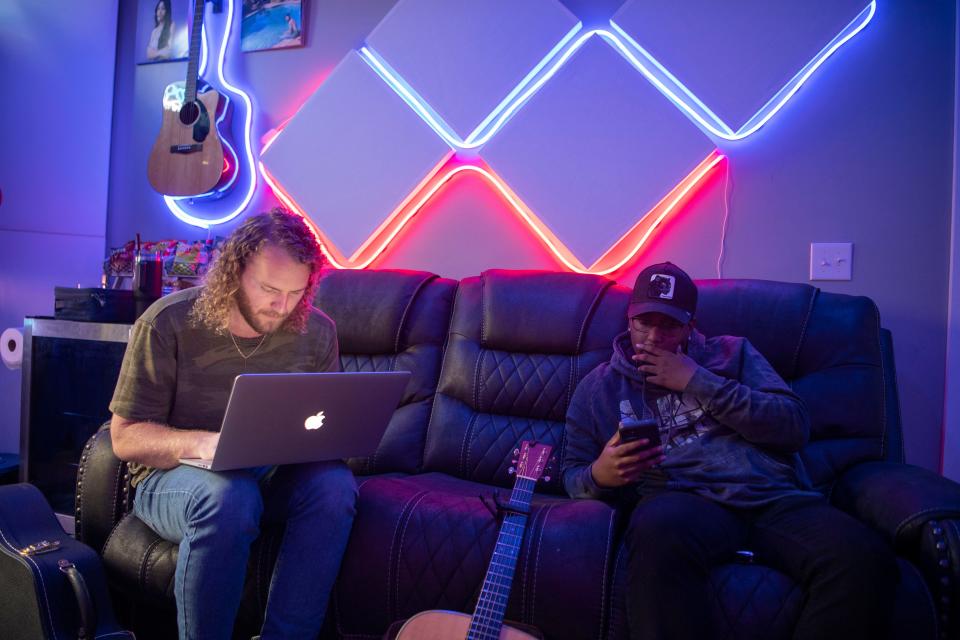
AI can generate lyrics, beats and even mimic voices
There are no shortage of ways to use AI to create a song, from lyrics to beats and chord structures to voice samples, artificial intelligence has the ability to create never-before-heard compositions.
There are AI tools that can generate original lyrics, like popular website These Lyrics Do Not Exist, which creates original verses and choruses with state-of-the art AI. Another is AUDOIR, a form of AI that crafts lyrics that rhyme and hit a specific number of syllables. Users can enter a topic, mood or genre, and AUDOIR will oblige.
Songwriters can even use the ever-popular ChatGPT, an AI chatbot that was developed by tech company OpenAI and launched in November 2022. Since the bot's release, the language processing tool has become widely popular and can create lyrics similar to other AI platforms.
This is only the beginning of AI's use in the songwriting room. AI beatmakers include software Mubert and Beatoven, or chord progressions generators, like Output or Chord AI.
There are tools that create mock voices, like Voicify AI, Uberduck or Murf AI, and can take existing recordings of artists and spit out tunes in their likeness. These tools can also create artificial, original voices, which can be layered over tracks.
The bottom line is — there are hundreds, maybe thousands, of AI tools dedicated to different components of songwriting.
And because of potential stigma associated with the use of AI in creative arts, at this time it is impossible to fully account for AI's use in songwriter rooms within Nashville and beyond.
AI in music: A time-saver or creative threat?
Well beyond Nashville's country music rooms, AI is taking hold.
Ramon "Illmind" Ibanga Jr., a 2x Grammy award-winning and ten-times nominated multi-platinum music producer, is well-versed in the world of AI music production. "I think creators potentially are warming up to the fact that it can be used as like a very powerful tool," he said.
He has been in the business for 20 years, working with artists like Kanye West, J. Cole, Drake Kendrick Lamar, Beyonce, Travis Scott and many other industry staples in pop and hip-hop music. And — he says he can save up to hours per day using AI in his creative process, depending on the context of his work.
"Instead of sitting there, finding a good melody with my hands on a keyboard, which I still do, obviously, but instead of being limited to just doing that, now, I could just ask AI to start those ideas for me, and then I can use that as inspiration to manipulate and finish," Illmind said.
"I'm definitely for AI when it comes to leveraging it as a tool to be creative," he said. "I think it's important for us, as creators, to be mindful of the dangers but also be mindful of how can we leverage this amazing technology to make music better, and to be more productive and to have more output in what we're doing and ultimately, hopefully increase the quality of our music."
On the other end of the spectrum is Nashville songwriter Chris DeStefano. He does not use AI in his songwriting process. DeStefano's role as a songwriter, though, is potentially less tech-focused and would lend itself to different uses of AI than Illmind's role in music production.
"I'm able to make the journey and see the beautiful things along the way a little bit," DeStefano said of his personal process.
DeStefano, an award-winning Nashville songwriter, has been a professional in the industry for 13 years. A Grammy-award winning songwriter, he's written hits for Jason Aldean, Luke Bryan, Miranda Lambert and Carrie Underwood.
DeStefano said that he feels like using AI on his own production of chords or melodies "feels like I'm compromising too much."
"Ethically it feels a little bit off to me," he said.
But when it comes to using AI to search for lyrical ideas or a place to get started, he said, "It's almost no different than Google. It's just Google on steroids to me."
And though he doesn't use AI himself, he says other artists who are regularly using AI doesn't bother him.
Out of curiosity, DeStefano once asked ChatGPT to write a lyric in the "Chris DeStefano" style. "I was like, this isn't terrible at all. If somebody brought this lyric to me, I'd be like, 'Yeah, it's a good lyric.'"
When it comes to his own personal work fueling AI's ever-growing knowledge of songwriting, and the fact that AI can now eerily imitate his songwriting style, he said an elegant solution is needed. "I'm not going to lose any sleep over it. It's a great problem to have, right?"
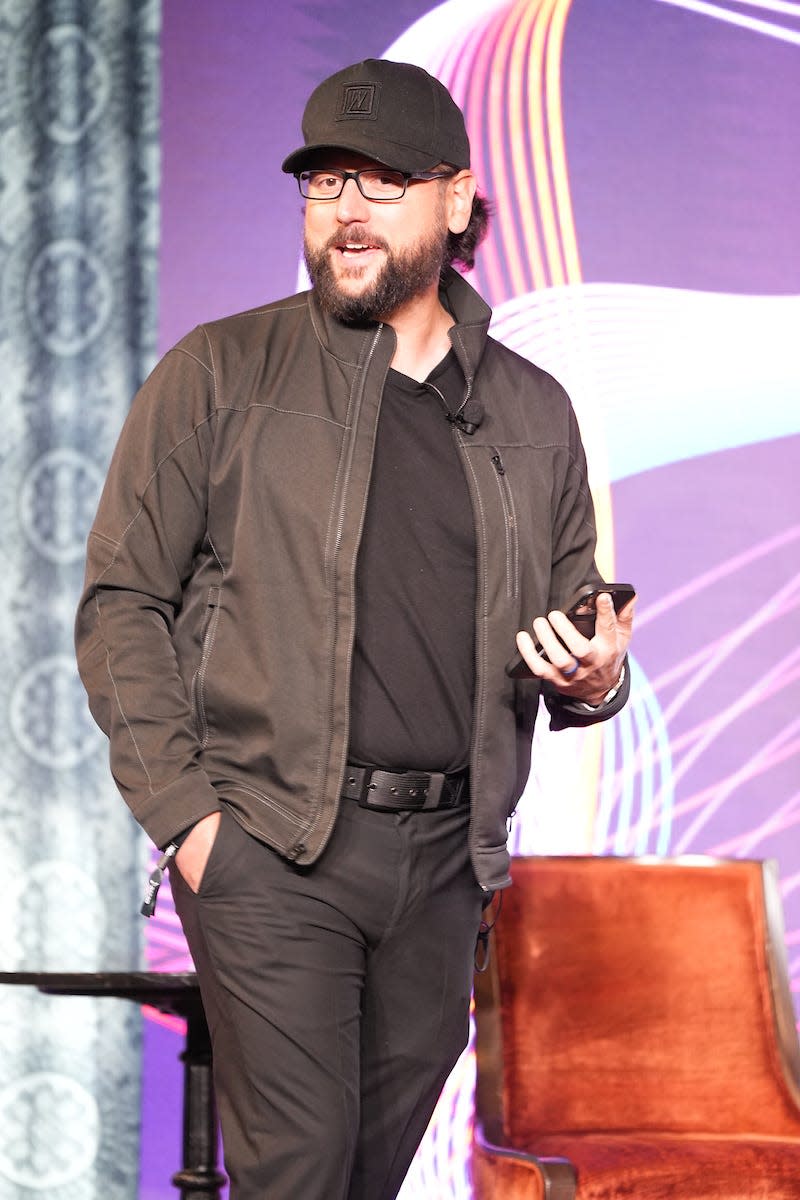
Music industry jobs, profits at risk
Released in April 2023, song "Heart on my Sleeve" was written by a TikTok songwriter named Ghostwriter and performed by the "voices" of Drake and The Weeknd.
But it wasn't actually Drake or The Weeknd. It was AI generated likenesses, crafted through voice-creating AI software.
The song was submitted for Grammy consideration but found not eligible after it was removed from streaming services due to legal action by Universal Music Group, the group that releases both Drake and The Weeknd's music.
This episode highlights the crux of tensions surrounding AI. These tools can replicate the voices of your favorite artists, saving time and opening creative doors.
A songwriter may finish a demo, a rough draft of a song, and wonder what Chris Stapleton or Jelly Roll would sound like on the track. Instead of taking up a busy artist's time before knowing if the song is a fit, writers could test the sound of a potential singer over the track, which could in turn save the production studios funds.
On the other hand, these tools could spell lesser demand for "demo artists," professional singers hired by studios to come in and record the demo before they are shopped to artists.
AI, here, could potentially cost humans their jobs.
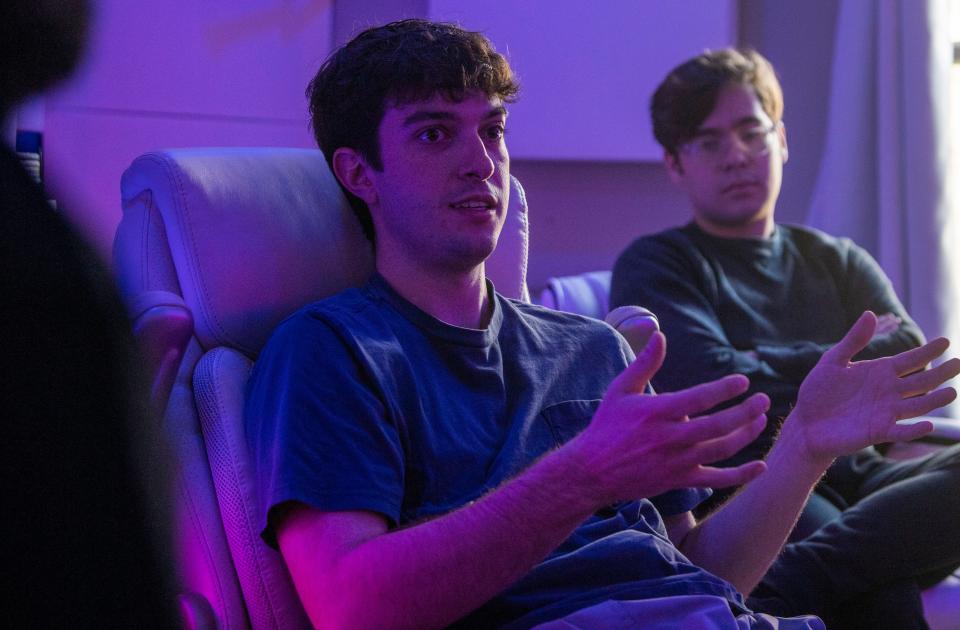
Jen Jacobsen, the executive director of the Artist Rights Alliance (ARA), has spent recent months learning what most artists are nervous about when it comes to AI. The ARA advocates for the rights of musicians, songwriters and performers in an ever-evolving digital landscape.
Jacobsen says that in her experience, creatives are not worried about the overall existence of AI. Uncertainty remains in the artist community because these generative models are being developed in ways that lack transparency.
They also are concerned about retaining control of their work.
"They don't have the ability to say, 'No, you can't use my work, or at the very least you must pay me for it,'" Jacobsen explained.
It comes down to consent, compensation and transparency for the Artist Rights Alliance.
Some companies are working devoutly within these ethical frameworks. For instance, a tool under development by YouTube and Google DeepMind called "Dream Track for Shorts and Music AI tools," powered by music generation tool Lyria, is working alongside artists in its creation phase.
Announced Nov. 16, 2023, artists Alec Benjamin, Charlie Puth, Charli XCX, Demi Lovato, John Legend, Papoose, Sia, T-Pain and Troye Sivan are collaborating with the experiment. The singers are lending AI versions of their voices to the tool's users, who can type in prompts and produce 30-second song shorts with one of the artist singing.
“I'm extremely excited and inspired..." singer Charlie Puth told YouTube.
"YouTube has been a great partner in outlining their approach to AI and understands the need to work together to develop this technology responsibly, ensuring it will accelerate creativity instead of replacing it.”
Legal wrangling, federal legislation underway
The widespread use of songs, whether it is in a TV show, sampled in a new song, or being performing, is a complicated matter. To use a song, one needs to contact the holder of the song's license and agree to terms of use. For more famous songs, there may be larger fees involved in this process.
The ARA is working with Congress to pass a bill on this topic with U.S. Representative Deborah Ross (D-NC), called the Protect Working Musicians Act, which was introduced to the House on Sept. 19, 2023.
On Ross's website, a breakdown of the bill written by Chris Cooke, the co-founder of Complete Music Update, notes not all AI companies are convinced they need licenses to make use of existing music.
Some companies do understand the value of licensing, yet how they are approaching the topic is still largely unknown. For independent artists, Cooke notes, it appears likely that "participation will be via distributors or take-it-or-leave-it generic terms."
Many independent artists, an explainer for the legal reform says, are "forced to accept whatever terms are offered by these platforms, while also having almost no ability to engage with AI companies who routinely scrape and use their music without permission or consent."
The Protect Working Musicians Act will work to allow independent artists the ability to collectively negotiate with streaming platforms, like Apple Music or Spotify, and AI developers, without challenges posed by antitrust laws.
“Working musicians and small independent labels face urgent challenges to their livelihoods posed by the market power of streaming platforms as well as the explosion of AI applications that use their work without licensing or pay," Congresswoman Ross said.
"This legislation will help give small, independent music creators a level playing field, empowering them to stand together for fairer compensation and giving them a voice in important negotiations that will determine the future of the music industry".
'Human artists must be protected'
Industry professionals agree that the best course of action is to keep a thoughtful eye on the state of songwriting creation and use of technology as advances continue to occur.
Education is key here, like performing rights organization ASCAP's symposium on AI in Nashville in October, where they hosted a panel with experts to give creators legal and professional updates.
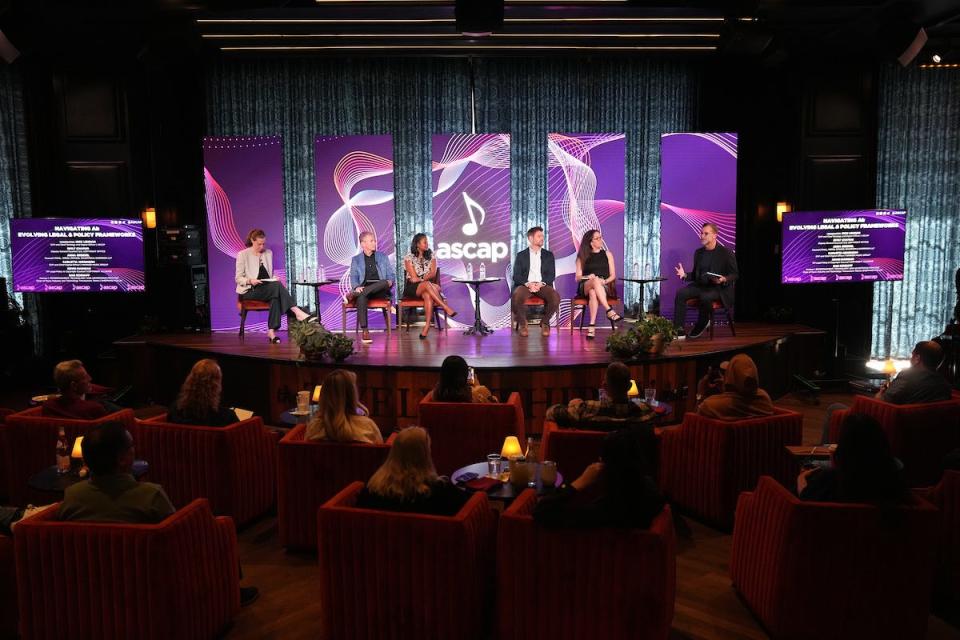
Aside from arming oneself with information, time is essential.
"Currently, it's a wait and see in terms of let's see how the market develops, because there's no advice," said Jacobsen. "There's no specific way that artists can play a role in the use of AI as a single individual," she explained.
The consensus among professionals, though, is that human art is irreplaceable.
Jacobsen believes AI is not in a place where it can replace what is so essentially human about music. "Let's not stop the technology, but let's recognize that it is that is the human that creates the art and that the human artists must be protected so that they can continue to make beautiful art that supports our culture."
In the Nashville songwriting session with RVSHVD, Noah Brown, a producer, audio engineer, songwriter and founder of SoundS StudioS Nashville agreed. He said, "Each producer, mix engineer, has their style, and people also fall in love with the style of the people behind the music.
"I don't think AI will ever completely replicate that."
This article originally appeared on Nashville Tennessean: AI in music: Nashville artists, legislators weigh in on AI debate

